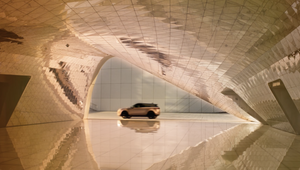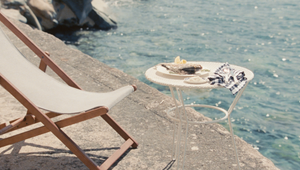
Camera Obscura: Michael O’Connor on Immersing into the Worlds of Artistry and Technology

Directors Michael O’Connor and Kaine Horey would love to tell others they met on an adventure in some remote part of the Tibetan wilderness and quickly began working on high budget commercials with the biggest brand names in the world. In actuality, they met on the second floor of a small, slightly run-down studio south of the river in one of the less ‘cool’ parts of East London. Despite their surroundings, they quickly recognised they had found in each other someone that shared a deep love of timeless, cinematic storytelling and, even more so, someone willing to push the envelope as much as themselves. Over the years that followed, Michael and Kaine stretched every project they came across as much as they could (occasionally making things much harder for themselves). Working across multiple continents with diverse cultures and often adverse conditions, they took every script to the next level. It wasn’t until on a project in the Yellow Mountains of China, Kaine, riddled with fever, pointed out to Michael, more sleep-deprived and hungry for plain chicken than he’d ever been, that they ought to drop the ‘and’ between Michael and Kaine. Thus Michael – Kaine, the director duo, was born.
LBB> What is your niche craft obsession?
Michael> One of the things that most drew me towards filmmaking was the variety of skills, disciplines and technologies it encompassed. Film is a beautiful intersection between art and science, but not just one of each; countless arts and sciences have come together to make filmmaking possible from the first days of the industry to today. This convergence is perhaps most clearly and symbolically embodied by modern 'Digital Cinema Cameras', and so, for the purpose of this article, they are my 'Niche Craft Obsession.' (Though really, I have many).
LBB> Where/ when/ how did you first come across this thing?
Michael> The first camera I ever owned, personally, was a Canon 5D MKII. This iconic DSLR was a lynchpin in my career. I can directly trace the work I have today back to the images and showreel I ultimately created with that camera. It feels like this is one of the earliest attempts to bring the concept of cinematic filmmaking to a consumer level. The full-frame sensor finally allowed us mortals to achieve a more 'cinematic' depth of field without needing to use inappropriately long lenses or janky adaptors, with a ground glass that made the camera look like a bazooka with a periscope on the front.
LBB> Was it an obsession straight away or something that has evolved over the years?
Michael> This obsession has continued to grow more and more as technology has developed. I was an early owner of the Arri Alexa Mini. This camera brought the unrivalled colour science and cinematic beauty of the Arri sensor and put it in a lightweight, affordable package. In doing so, it revolutionised the world of digital filmmaking. A camera that captured countless Oscar-winning films was now available to me. When you feel like technology is holding you back, that inspires a certain kind of ingenuity, and that is always a fun place to be. But, there is a very different and still very much compelling form of inspiration that comes from understanding the countless creative opportunities a piece of technology can offer and ultimately knowing you, the director/cinematographer, are holding it back, not the other way around.
LBB> What are the most interesting debates or conversations you are having around this obsession?
Michael> The debates in this sphere are endless as developers like Sony and Arri keep on releasing new cameras and new capabilities. There's the inclusion of dual sensitivity on many new cameras, allowing them to shoot clean images in much lower light. The crazy all-out low light capabilities of cameras like the Sony FX3 and FX6 are now producing beautiful, usable and, above all, cinematic images at 12800 ISO, a whopping four stops higher than a typical base ISO of 800. Or the vast dynamic range of the new Alexa35, 17 stops over the previous standard of 15.
The exciting thing is how these numbers extrapolate to actual, tangible results. For example, the low light capabilities of the Sony FX3 quite literally saved a shoot of mine in Dubai from disaster. A unique supercar was delivered hours late, and the sun began setting halfway through our (already stripped back) shot list. Only a year or two before, there would have been nothing we could do. The sun would set, it would be too dark in the desert for conventional cameras, the car would never be available again, and large lights were just not possible. The Sony FX3, in real terms, allowed us to shoot an additional hour and a half of footage into the night, the final shots lit only by the glow of the distant Dubai city lights bouncing up to clouds above and back down to the desert sand. I later used this same camera to shoot a dreamy sequence of elephants drinking and washing in the Zambezi River at night, lit only by moonlight. The latitude of the new Alexa35 is making it possible to keep skies and windows exposed using smaller, more efficient and cost-effective lights to balance interiors and shadows.
It's when the new capabilities result in real word advantages like the ones above that I'm most excited, especially when those developments stay true to the artistic goal we're pursuing. Not only delivering new technologies but helping us tell meaningful stories in cinematic ways using those technologies. This is when the discussions start to get interesting, hearing peers' and colleagues' experiences, learning from them and applying that knowledge to your own craft.
LBB> How widespread do you think this obsession is with your peers?
Michael> I think they're everywhere. Though, in many ways, Digital Cinema Cameras are now so ubiquitous we sometimes forget they are a subcategory within a much larger field of camera platforms available.
LBB> For anyone just getting into your field, what advice would you share to help them get their head around this particular thing?
Michael> For anyone just entering the field of cinematography and digital cinema cameras, my advice would be to immerse yourself in the world of both artistry and technology. Embrace the technical aspects of this industry, but always remember that your ultimate goal is to tell compelling stories. Experiment, learn from your experiences, and collaborate with fellow filmmakers. Stay informed about the latest developments in the industry, but also develop your unique artistic voice. And above all, never forget to constantly challenge yourself and push the boundaries of what is creatively possible with the incredible tools at our disposal.















